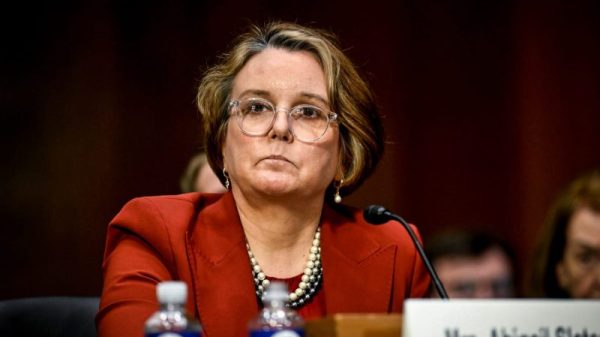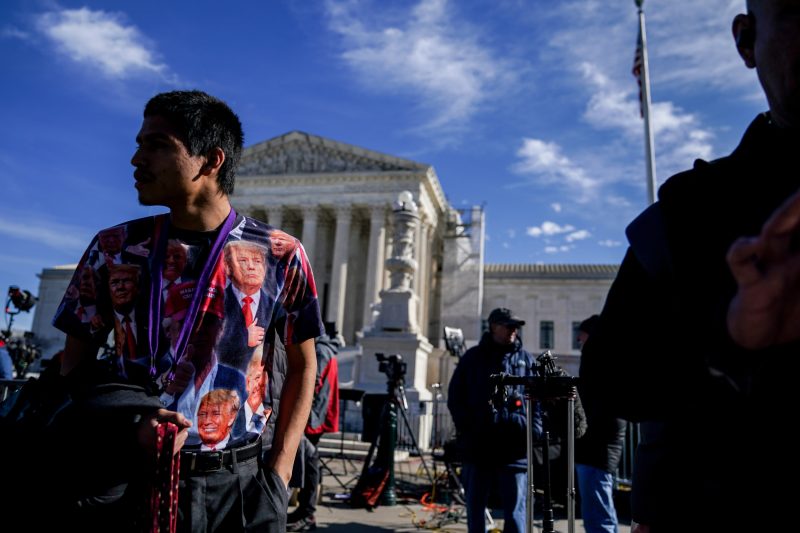The Supreme Court on Monday unanimously sided with former president Donald Trump, allowing the 2024 Republican presidential front-runner to remain on the election ballot and reversing a Colorado ruling that disqualified him from returning to office because of his conduct around the Jan. 6, 2021, attack on the U.S. Capitol.
The justices said the Constitution does not permit a single state to disqualify a presidential candidate from national office. The court warned of disruption and a chaotic state-by-state patchwork if a candidate for nationwide office could be declared ineligible in some states, but not others, based on the same conduct.
“Nothing in the Constitution requires that we endure such chaos — arriving at any time or different times, up to and perhaps beyond the inauguration,” the court said in an unsigned, 13-page opinion.
The court’s decision to keep Trump on the ballot applies to other states with similar challenges to his candidacy and, for now, removes the Supreme Court from directly determining the path of the 2024 presidential election.
While the decision was unanimous, the court’s three liberal justices also wrote separately, saying the conservative majority went too far and decided an issue that was not before the court in an attempt to “insulate all alleged insurrectionists from future challenges to their holding office.”
The justices fast-tracked the challenge from voters in Colorado and issued their decision one day before Super Tuesday, when that state and more than a dozen others hold nominating contests. In a sign of the high court’s awareness of the election calendar, the justices took the unusual step of announcing the opinion on the Supreme Court’s website on a day when the court was not in session, instead of issuing it from the bench later this month.
Trump praised the ruling as “well-crafted” and “extremely important” in remarks from Mar-a-Lago, his Florida home and private club, on Monday afternoon.
Trump’s eligibility to return to office was not the only question before the justices that could affect the electability of the former president, who is facing four criminal indictments, two of them related to his efforts to block Joe Biden’s 2020 election victory. The high court next month will hear Trump’s claim that he is protected from criminal prosecution by presidential immunity. The justices’ decision to take that case delayed Trump’s D.C. federal trial for allegedly trying to overturn the 2020 election results until at least late summer, just a few months before the general election.
The justices separately have agreed to review the validity of a law that was used to charge hundreds of people in connection with the Jan. 6 riot and is also a key element of Trump’s four-count federal election obstruction case in Washington.
Trump is the first former U.S. president ever charged with a crime. The high court’s involvement in his legal and political future as he campaigns to return to the White House has made the 2024 election an unprecedented test of America’s judicial and democratic institutions.
In the Colorado case, the justices were reviewing a decision from Colorado’s top court that relied on a long-dormant post-Civil War provision of the 14th Amendment to declare Trump ineligible to return to the White House. The case thrust the Supreme Court into a pivotal role not seen since 2000, when the high court’s decision in Bush v. Gore handed the presidency to George W. Bush and bitterly divided the nation.
The provision prohibits anyone who previously pledged to support the Constitution as “an officer of the United States” from returning to office if they betrayed their oath by engaging in insurrection. The text of Section 3 does not specify who is supposed to enforce the clause or when it should be invoked.
The court’s opinion Monday did not address the question of whether Trump engaged in insurrection. It also did not list a single justice as the primary author and was instead issued “per curiam” in an effort to show unanimity.
The justices drew a clear distinction between state and national elections, writing that “States may disqualify persons holding or attempting to hold state office. But States have no power under the Constitution to enforce Section 3 with respect to federal offices, especially the Presidency.”
Five of the six conservative justices then went further, writing that the disqualification clause can only be enforced for national office through federal legislation — not a federal court challenge or nonlegislative action by Congress. “Responsibility for enforcing Section 3 against federal officeholders and candidates rests with Congress and not the States,” the majority said.
Legal analysts said that requirement would presumably prevent Congress from trying to enforce the statute by refusing to count Trump electoral votes at the Jan. 6, 2025, joint session to certify the election results.
The three liberal justices, in their sharply worded concurrence, said the majority’s approach “shuts the door on other potential means of federal enforcement. We cannot join an opinion that decides momentous and difficult issues unnecessarily.”
The majority, they said, had foreclosed enforcement through the courts if, for instance, “a party is prosecuted by an insurrectionist and raises a defense on that score.”
By dictating how Section 3 is enforced, Justices Sonia Sotomayor, Elena Kagan and Ketanji Brown Jackson added, the majority “attempts to insulate all alleged insurrectionists from future challenges to their holding office. In a sensitive case crying out for judicial restraint, it abandons that course.”
They criticized the majority for creating what they called a “special rule” for disqualification, noting that other sections of the 14th Amendment, including due process and equal protection guarantees, do not require specific implementing legislation.
The three justices also appeared to call out Chief Justice John G. Roberts Jr. for not taking a more narrow path in the Colorado case. Their concurrence opens with a quote from Roberts’s own concurrence in the 2022 Dobbs decision upholding Mississippi’s 15-week abortion ban, when the chief justice urged his conservative colleagues not to take the additional step of overturning Roe v. Wade.
“If it is not necessary to decide more to dispose of a case, then it is necessary not to decide more,” Roberts wrote at the time.
Justice Amy Coney Barrett, a conservative, agreed with the liberals in part, writing separately to say that the lawsuit before the court “did not require us to address the complicated question of whether federal legislation is the exclusive vehicle through which Section 3 can be enforced.”
But she also appeared to chide the liberals for the tone of their concurrence, saying this fraught political moment was not a time to “amplify disagreement with stridency.”
“The Court has settled a politically charged issue in the volatile season of a Presidential election. Particularly in this circumstance, writings on the Court should turn the national temperature down, not up,” Barrett wrote.
Language embedded as “hidden text” in the digital version of the court’s opinion, but not visible in the public-facing document, suggests there may have been even more disagreement among the justices initially. The text — hidden at the top of the concurrence and first reported by Mark Joseph Stern of Slate — lists Sotomayor as “concurring in part and dissenting in part,” suggesting that earlier in the process the concurrence might have included a partial dissent.
The court did not respond to a request for comment about the hidden text.
The challenge to Trump’s candidacy was brought by six Colorado voters — four Republicans and two independents. The Colorado Supreme Court found Trump engaged in insurrection when he summoned his supporters to Washington and encouraged an angry crowd to disrupt Congress’s certification of Biden’s victory.
Noah Bookbinder, president of Citizens for Responsibility and Ethics in Washington, which helped bring the lawsuit, posited that by not addressing the insurrection question, the high court let that finding from Colorado stand. He also said the voters, not the courts, would have to pass final judgment on Trump’s conduct.
“The Supreme Court removed an enforcement mechanism, and in letting Trump back on the ballot, they failed to meet the moment,” Bookbinder said in a statement. “But it is now clear that Trump led the January 6th insurrection, and it will be up to the American people to ensure accountability.”
Trump’s legal team said the court’s ruling is a “victory is not just for President Trump but for the integrity of our electoral system and the rights of voters across the country.”
“The attempt to use the 14th Amendment in this manner was a dangerous overreach that, if left unchallenged, could have set a perilous precedent for future election,” attorney Harmeet K. Dhillon said in a statement.
At oral argument on Feb. 8, justices from across the ideological spectrum warned of troubling political ramifications if they permitted Colorado to order the leading Republican presidential candidate off the ballot. Several justices suggested such a decision would throw the presidential race into turmoil and lead other states to try to disqualify Democratic candidates.
Trump’s lawyer, Jonathan Mitchell, told the court that enforcement of the disqualification clause is up to Congress, not state courts or officials. In addition, Mitchell said Section 3 does not apply to Trump because the president is not an “officer of the United States,” which is one of the terms the section uses when discussing potential insurrectionists. The justices did not embrace that argument in Monday’s opinion.
Jason Murray, the lawyer for the Colorado voters, urged the justices to definitively resolve the question of Trump’s eligibility. He warned that if they did not do so, Congress could still try to disqualify Trump and prevent him from taking office if he wins the general election.
Derek Muller, a Notre Dame Law School professor closely following the case, said the court’s decision “does not resolve the contentious insurrection issues, which will remain live and disputed in the public domain in the months to come. But it shuts the door on any exclusion of Trump from the ballot in any state, either in the primary or the general.”
The case is Trump v. Anderson.
Chris Dehghanpoor and Amy B Wang contributed to this report.





























